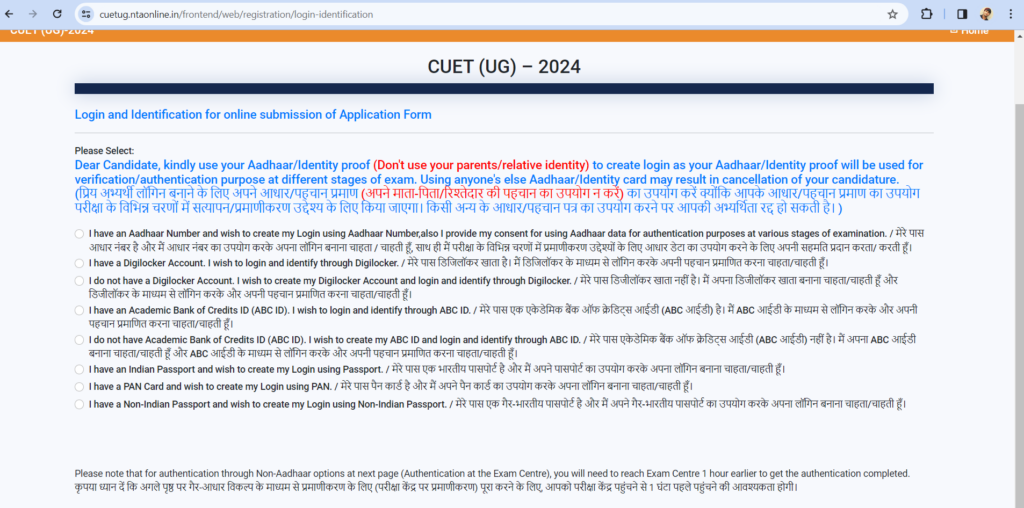As lakhs of students brace themselves for the upcoming Common University Entrance Test (CUET UG 2024) for their undergraduate studies, the registration process adopted by the National Testing Agency (NTA) has raised many questions. The NTA is a nodal body under Ministry of Education that is responsible for conducting CUET entrance tests. Cyber security researcher Avinav Kumar after studying the CUET UG registration website has observed that only 2 out of 8 options provide students without Aadhar ID an option to register themselves for the test. Even the 2 remaining options require passport, one each for Indian and non-Indian passport. Avinav Kumar has also written a letter on March 25, 2024 to Subodh Kumar Singh, Director General, National Testing Agency (NTA), Department of Higher Education, Union Ministry of Education seeking alternative option for registration and application without UID/Aadhaar Number.
As per the analysis of the data revealed in the parliament on February 8, 2024 by MoS, Ministry of External Affairs, only 9,26,24,661 Indians held passports in 2024, which is less than 10 percent of the population. This means that NTA is virtually forcing students to provide Aadhar ID, violating the landmark privacy judgement of the apex court delivered in Justice K.S.Puttaswamy (Retd) vs Union of India in 2018 (also known as Aadhaar judgement). In the Aadhaar judgment while the Supreme Court had upheld the constitutional validity of Aadhaar Act, 2016, it also struck down some of the provisions of the Act and declared that the ambit of Aadhaar should be limited. It had noted that the government cannot make Aadhaar a prerequisite for availing non-welfare benefits or services.
Why NTA should provide other options to students
CUET UG is a common entrance test for hundreds of universities in the country, including central, state, and private universities for various courses and programmes. Its test centres are spread across the states covering virtually the whole of the country. Given the sheer number of candidates who apply for CUET entrance test across the country, it is imperative that the process remains as inclusive, open, and least intrusive as possible. In 2023, a total of 16 lakh students had registered for CUET UG across 242 universities, revealing the scale of the entire exercise.
In the circular issued by the Unique Identification Authority of India (UIDAI) on September 5, 2018, which is a nodal agency for Aadhar, it noted that “It must be ensured that no children are deprived/denied of their due benefits or rights for want of Aadhaar. Some instances have come to our notice that few schools are denying admission to children for want of Aadhaar. Such denials are invalid and not permitted under the law. It is also to be ensured that no child should be denied admission and other facilities for lack of Aadhaar.”[1]
Thus, UIDAI had recognised that Aadhar was contributing to the exclusion of school students. In the present case, NTA can be seen doing something similar, which was earlier flagged by UIDAI at the school level. While NTA may justify its conduct, arguing that in the case of school students, they were minor children and therefore the comparison cannot be drawn between the two cases. Nonetheless, this does not address the issue of compulsory requirement of Aadhar, since for availing non-welfare services only voluntary provision is provided in the law. In addition, a minor who has created her Aadhar card with the consent of her guardian is provided with an option to cancel the same upon attaining majority age.
The concern also arises as NTA refuses to consider other government issued identity proofs, including voter ID, driving licence, education board certificate, among others. This is problematic as the aforementioned documents are valid legal documents, but in spite of that, NTA refuses to accept them, raising concerns over legitimacy of non-Aadhar ID proofs.
Additionally, the privacy risks posed due to the collection and use of Aadhaar data is another aspect which NTA needs to consider. As the Aadhar details are linked with others private information like PAN Card, bank account, driving licence, to name a few, NTA ought to be well aware of the risks posed due to leakage or misuse of Aadhar data. Furthermore, the privacy policy is not readily shown on CUET UG registration website, which makes it difficult to assess the standards and policies adopted by NTA to secure and process the data of the registering students.
Privacy rights, Aadhar and CUET
In the landmark privacy rights judgment delivered in 2017 by the nine-judge constitutional bench of the Supreme Court, it was unanimously held that the right to privacy is a fundamental right of citizens and part and parcel of Article 21. In a separate judgment delivered in 2018, while upholding the Aadhar Act, it struck down Section 57 of the Act which provided powers to private entities for mandating Aadhaar ID for availing their services. The court had noted that there was no nexus between giving such powers to private entities and the intended aim of the legislature, which was to enhance welfare services of the citizens and prevent leakages. Similarly, though the NTA is a government body, the CUET UG entrance test has no nexus to the intended aim of the Aadhar Act, which is to improve welfare services. Therefore, it can only voluntarily ask for Aadhaar ID of registering students, but cannot force them to submit one. The doctrine of colourable legislation ensures that whatever is prohibited directly is also prohibited indirectly. Hence, the Aadhar Act cannot allow NTA to indirectly force the student to submit their Aadhar ID for the purpose of CUET entrance test, as it will violate students’ right to privacy.
Furthermore, the Digital Personal Data Protection Act, 2023 (DPDP), virtually exempts Central Government and all its entities (NTA being part of it) from providing any data protection measures required under the Act, as most of the provisions of the Act does not apply to the Central Government or any entity of the Central Government. While DPDP Act is yet to be notified in the absence of the rules, the lack of data protection norms makes the situation no better.
As the CUET UG 2024 deadline stands extended till March 31, 2024, we wait for NTA to make the registration process more inclusive and less intrusive.
The relevant documents and screenshot can be found here:
Note: We would like to acknowledge Citizens Forum for Civil Liberties (CFCL) for sharing the relevant material with us and bringing forth this issue.
(The author is part of the Legal Research Team)
[1]https://uidai.gov.in/images/resource/Circular-School-06092018.pdf
Related:
State-sponsored Doxing: Is it even legal?
SC upholds Aadhaar’s Constitutional Validity, but partially addresses Privacy Concerns
Linking Aadhaar to Social Media



